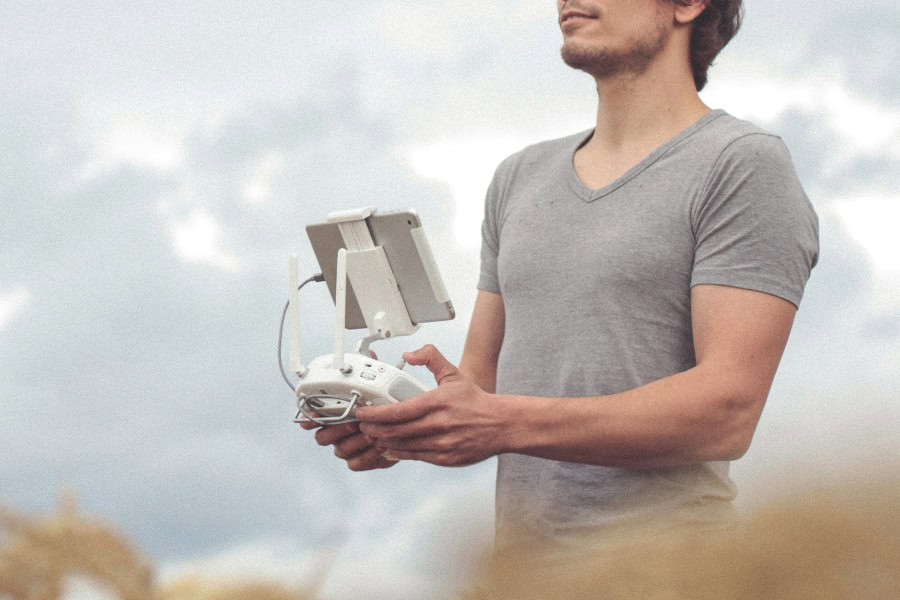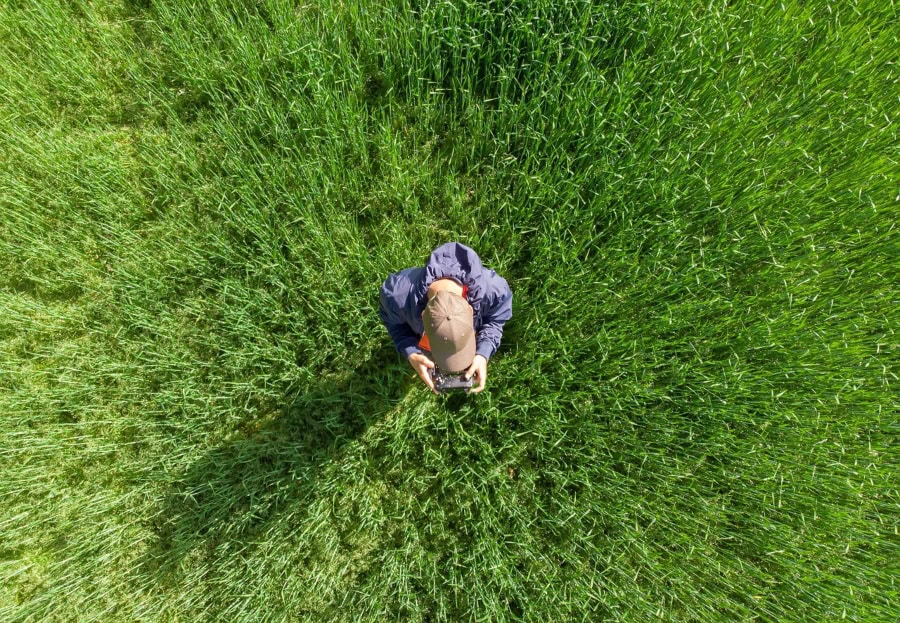How to Start a Drone Business: A Complete Guide—Includes 36 Drone Business Ideas [New for 2024]
BY Zacc Dukowitz
18 June 2024Want to start a drone business? Or already have one and want ideas to help it grow?
There are dozens of ways you can make money flying a drone these days. And more and more drone pilots are going into business for themselves, either as a side hustle or as a full-time gig.
In this in-depth guide to drone businesses, we cover the basics for getting your drone business started, including a step-by-step guide that covers everything you need to know.
We also have a list of 36 drone business ideas to help you come up with ways to make money with your drone.
Here’s a menu in case you’d like to jump around:
- How Much Can You Make Running a Drone Business?
- Drone Business Startup Costs
- How to Start a Drone Business: A Step-by-Step Guide
- The Top 7 Most Profitable Drone Business Ideas
- 29 More Drone Business Ideas
How Much Can You Make Running a Drone Business?
On average, commercial drone pilots working full time can make between $50,000 to $100,000 annually.
The profitability of a drone business can vary significantly depending on several factors, including:
- The niche you choose.
- The location where you work.
- The level of skill and certification you’ve achieved as a drone pilot.
In some specialized fields, you can make a lot more than $50-$100K a year. Three of the most lucrative areas to be a drone pilot right now are aerial mapping, cinematography, and industrial inspections.
You’ll notice right away that each of these requires skills beyond just flying a drone.
For aerial mapping, you need to have a good sense of how to do mapping and how to use mapping software. For cinematography, you’ll need to understand how a drone pilot’s work fits into the fast-moving schedule of a TV or movie production, and how to actually get the aerial shots a director wants. And for industrial inspections you’ll probably need some basic understanding of how inspections work, or at least an internal contact in a company that does inspections.
Among these three, aerial mapping is probably the easiest to get into. Why? Because you don’t necessarily need strong contacts who are already doing the work to find clients.
If you can hone your mapping skills and start offering solid services, you have a good chance of building a client base.
[Want to offer drone mapping? Learn more about our online aerial mapping course, Drone Mapping Essentials.]
Key Factors Influencing Drone Pilot Income
1. The Niche You Choose
Specialized services can command higher fees.
For example, agricultural surveying and real estate drone photography can be highly profitable due to the unique value they provide.
In agriculture, drone pilots can perform tasks such as crop monitoring and health assessment, which are crucial for maximizing yields. This can lead to substantial earnings, with some operators charging $150 an hour or more for their services.
In real estate, realtors can use drone photography and videography to create compelling property listings that can significantly enhance the marketability of homes. Drone pilots in this niche can charge between $200 and $400 per project, and sometimes a lot more, depending on the complexity,location, and quality of their work.
2. The Location Where You Work
The geographic area where you operate your drone plays a crucial role in determining potential earnings.
Urban areas or regions with high economic activity typically offer more opportunities for drone services and, consequently, higher rates. For example, drone operators in metropolitan areas like New York or San Francisco can charge premium rates for services due to the high demand for aerial footage in real estate, construction, and media industries.
In contrast, operators in rural or less economically vibrant areas may find fewer opportunities and lower rates for their services. However, niches like agricultural surveying may still be lucrative in these regions.
3. The Level of Skill and Certification You’ve Achieved
Having advanced certifications and extensive experience can help you make more as a drone pilot—sometimes a lot more.
To start, any drone pilot doing work should have a Part 107 certificate. This is required for commercial drone work, and most clients know to ask about this these days.
But getting certifications in actual piloting skills—and, beyond that, actually doing lots of the work you become certified in—can also help you land profitable clients.
Specialized training in areas like thermal imaging or GIS (Geographic Information Systems) can open up higher-paying opportunities in sectors such as infrastructure inspections and environmental monitoring. And drone pilots with these advanced skills can earn $150 to $300 per hour or more.
[Related read: Can You Shoot Down a Drone Over Your Property? And What Do You Do If Someone Shoots at Your Drone?]
Additional Factors that Impact Drone Business Income
Here are some other things to think about when it comes to how much you can make running a drone business:
- Diversity of services. A drone business that provides multiple services, such as aerial photography, surveying, and drone mapping, can attract a broader client base and increase their revenue streams. But be careful—offering too many types of services can stretch you thin, and may be a red flag to potential clients that you’re not actually an expert in the services you’re selling.
- Project-based earnings.Many drone businesses operate on a project basis, which can vary widely in terms of complexity and compensation. Simple aerial photography gigs for real estate might pay $200 to $500 per job, while more complex industrial inspections or land surveys can bring in several thousand dollars per project.
- Long-term contracts. Companies in construction, agriculture, or utilities often require ongoing drone services for monitoring and inspections—if you can get long-term contracts in areas that require repeat service, you can get steady income and financial stability.
Drone Business Startup Costs
Starting a drone business can be expensive, especially if you’re starting from scratch.
But how much exactly do you need to get started?
We’ve broken drone business startup costs into three tiers to help you see what it will cost depending on your budget. Each tier includes detailed cost estimates for essential items in starting a drone business, including things like drone hardware, software, training, insurance, and marketing.
1. Lean Drone Business Startup Costs
A lean startup approach is ideal for those looking to enter the market with minimal upfront investment. This tier focuses on basic equipment and essential certifications.
Here’s the breakdown:
- Drone hardware: $1,000 – $2,000. This budget allows for the purchase of a basic commercial drone suitable for general aerial photography and simple inspections.
- Training and certification: $150 – $500. Costs for obtaining the FAA Part 107 certification, including study materials and exam fees.
- Insurance: $500 – $1,000 annually. Liability insurance to cover potential damages and operational risks.
- Software: $200 – $500 annually. Basic software for flight planning and photo/video editing, such as DroneDeploy’s basic plan or Adobe Premiere Elements.
- Marketing and branding: $500 – $1,000. Initial costs for setting up a simple website, business cards, and some online advertising.
Total estimated lean startup cost: $2,350 – $5,000
2. Medium Drone Business Startup Costs
This tier is suitable for entrepreneurs looking to provide a wider range of services with higher-quality equipment and more comprehensive coverage.
- Drone hardware: $3,000 – $6,000. Mid-range drones such as the DJI Phantom 4 Pro or Autel EVO II that offer better camera quality and more robust features for commercial use.
- Training and certification: $500 – $1,000. Includes advanced training courses in areas like thermal imaging or 3D mapping to expand service offerings.
- Insurance: $1,000 – $2,000 annually. Comprehensive liability insurance with higher coverage limits for more extensive operations.
- Software: $500 – $1,200 annually. Advanced software for mapping, 3D modeling, and data analysis, such as Pix4D or advanced DroneDeploy plans.
- Marketing and branding: $1,500 – $3,000. Includes costs for a professional website, SEO services, and broader online and offline marketing efforts.
Total estimated medium startup cost: $6,500 – $13,200
3. Pro Drone Business Startup Costs
A pro-tier setup is designed for those aiming to launch a fully-fledged drone business with top-tier equipment and comprehensive service capabilities.
- Drone hardware: $10,000 – $20,000+. High-end drones like the DJI Matrice 300 RTK or Yuneec H520E that support a wide range of sensors and payloads for industrial applications.
- Training and certification: $1,000 – $2,500. Advanced certifications and specialized training in sectors like oil and gas inspections, search and rescue, or cinematic production.
- Insurance: $2,500 – $5,000 annually. Extensive liability and equipment insurance to cover high-value operations and assets.
- Software: $1,200 – $3,000 annually. Professional software packages for extensive data analysis, real-time monitoring, and comprehensive drone management systems.
- Marketing and branding: $3,000 – $7,000. Includes comprehensive branding services, extensive marketing campaigns, and participation in industry events to establish a strong market presence.
Total estimated pro startup cost: $17,700 – $37,500+
How to Start a Drone Business: A Step-by-Step Guide
Starting a drone business can be a rewarding venture, but it requires careful planning and execution.
Here are the key steps to follow when getting started to help you launch your drone business successfully.
Step 1: Get Certified
Before you can operate a drone commercially in the U.S., you must obtain your FAA Part 107 certification, which is required for commercial drone pilots.
The certification process involves studying for and passing a written exam that covers drone regulations, airspace classification, weather effects, and more.
We offer an online test prep course called Drone Pilot Ground School to help drone pilots get ready for the exam. We’ve trained over 60,000 pilots and have a pass rate of over 99%—learn more here.
Step 2: Choose Your Niche
Identify a specific niche for your drone business.
Popular niches include aerial photography, real estate surveys, agricultural monitoring, construction site inspections, and more. Make sure to choose a niche that has a viable market demand in your area and, ideally, aligns with your interests and existing skills (or skills you plan to establish).
You can do your market research on job sites like Indeed.com or just by searching for both “drone jobs in [your location]” and “[drone niche] in [your location]” to get a sense both for competition and for possible drone work opportunities.
Step 3: Buy Your Equipment
Invest in quality drone equipment that suits your chosen niche.
For example, a drone for aerial photography will need a high-resolution camera, while a drone for agriculture might require specialized sensors for crop monitoring.
Step 4: Get Insured
Obtain liability insurance to protect your business against potential damages or accidents. Drone insurance typically covers both the drone itself and any potential liabilities resulting from its operation.
Learn more about drone insurance with our partner Skywatch.
Step 5: Register Your Business
Choose a business structure (typically this will be an LLC or sole proprietorship) and register your business with the appropriate state and local authorities.
This step ensures that your business is legally recognized and allows you to operate under a business name.
Step 6: Create a Business Plan
Develop a comprehensive business plan outlining your business model, target market, revenue streams, and growth strategies. A solid business plan will help you stay focused and attract potential investors.
Step 7: Build Your Brand
Establish a professional online presence by creating a website and setting up social media profiles. Your brand should clearly communicate the services you offer and your unique selling points.
Step 8: Market Your Services
Implement a marketing strategy to reach potential clients. Use a mix of online advertising, social media marketing, and networking events to promote your services. Consider offering introductory discounts or packages to attract new customers.
Step 9: Network and Partner
Attend industry events and join professional associations to network with potential clients and partners. Building strong relationships within your industry can lead to valuable business opportunities and referrals.
Step 10: Get Clients!
This could also be Step 1, or even Step 0.
Without clients you don’t really have a business. So don’t be shy—get out there and start meeting with people, letting them know what you offer and offering to do work at introductory rates, or even for free at first until you have a client base.
The key is to start bringing in money as soon as you can, so you can have a sustainable business that supports you.
But also be patient. It may take months, or even years, before your business is bringing in the level of full-time income you want. If you work at it and are consistent and persistent, your business will grow over time.
The Top 7 Most Profitable Drone Business Ideas
Running a drone business can be pretty profitable—especially if you choose a niche that aligns your expertise with market demand in your area.
Here are some of the most profitable drone business ideas, with a breakdown of what’s required to get started, special skills needed, essential gear, and estimated startup costs.
1. Aerial Photography and Videography
Capturing high-quality aerial images and videos for various clients, including real estate agents, event planners, and marketing firms.
- Special skills. Proficiency in photography and video editing is essential, along with a good understanding of angles and lighting from the air.
- Gear. A drone with a high-resolution camera, a computer with video editing software like Adobe Premiere Pro ($20.99/month), and additional batteries.
- Estimated startup costs. $1,500 – $3,000.
- Tips. Market your services through social media and by building a portfolio on platforms like Instagram and YouTube.
2. Real Estate Photography
Providing aerial shots and video tours of properties for real estate agents and property developers.
- Special skills. Knowledge of real estate marketing and the ability to highlight property features from a bird’s eye view.
- Gear. A drone with a high-quality camera, like the DJI Phantom 4 Pro ($1,500 – $2,000), photo editing software, and possibly a drone with a 3-axis gimbal for stability.
- Estimated startup costs. $2,000 – $4,000.
- Tips. Develop partnerships with local real estate agencies and offer package deals for regular listings.

3. Agricultural Surveys
Using drones to monitor crop health, map fields, and provide farmers with actionable insights to improve yields and reduce costs.
- Special skills. Understanding of agriculture, precision farming, and the ability to interpret NDVI (Normalized Difference Vegetation Index) maps.
- Gear. A drone equipped with multispectral sensors, such as the Parrot Bluegrass Fields ($5,000 – $8,000), data analysis software, and a high-capacity battery.
- Estimated startup costs. $6,000 – $10,000.
- Tips. Connect with agricultural extension services and offer demonstrations to farmers.
4. Inspection Services
Conducting inspections for infrastructure such as bridges, buildings, wind turbines, and power lines to identify damage or wear.
- Special skills. Knowledge of inspection standards and the ability to operate drones in complex environments.
- Gear. A robust drone like the DJI Matrice 300 RTK ($12,000 – $20,000) equipped with thermal and zoom cameras, and inspection software.
- Estimated startup costs. $15,000 – $25,000.
- Tips. Certification in industrial inspection and safety training is highly recommended.
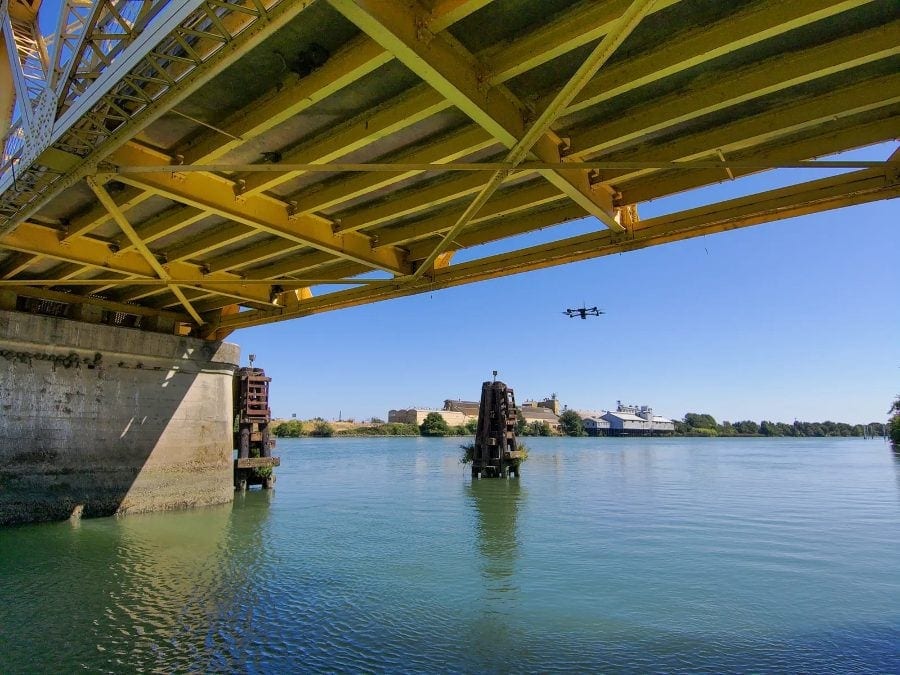
A drone being used for a bridge inspection | Credit: Skydio
5. Construction Site Monitoring
Providing aerial surveys and progress reports for construction sites to improve project management and ensure safety compliance.
- Special skills. Familiarity with construction processes and the ability to create detailed aerial maps and 3D models.
- Gear. A drone such as the DJI Mavic 2 Pro ($1,600 – $2,000) with mapping capabilities, photogrammetry software like Pix4D ($350/month), and additional batteries.
- Estimated startup costs. $3,000 – $5,000.
- Tips. Partner with construction companies to offer ongoing site monitoring services.
6. Event Photography and Videography
Capturing aerial footage of events such as weddings, concerts, and sports games to create unique perspectives and memorable highlights.
- Special skills. Experience in event photography, the ability to handle crowd settings, and advanced video editing skills.
- Gear. A drone like the DJI Air 2S ($999 – $1,299) for high-quality footage, video editing software, and extra batteries for extended coverage.
- Estimated startup costs. $1,500 – $3,000.
- Tips. Network with event planners and offer promotional deals to showcase your services.
7. Drone Mapping and Surveying
Providing detailed maps and 3D models for land surveying, urban planning, and environmental monitoring.
- Special skills. Proficiency in GIS (Geographic Information Systems) and knowledge of surveying techniques.
- Gear. A high-end drone like the SenseFly eBee X ($12,000 – $15,000) with mapping software, and RTK (Real-Time Kinematic) GPS equipment.
- Estimated startup costs. $15,000 – $20,000.
- Tips. Pursue certifications in surveying and mapping to enhance your credibility and attract higher-paying clients.
Want to learn drone mapping? Check out our online drone mapping course and our in-person drone mapping workshops.
29 More Drone Business Ideas
Looking for more drone business ideas?
Below we continue the list from the last section, adding 29 more ideas to make a total list of 36 drone business ideas.
8. Environmental Monitoring
Deploy drones to monitor environmental conditions, track pollution levels, and assist in conservation projects.
9. Security Surveillance
Provide aerial surveillance for security purposes, including monitoring large events, securing perimeters, and patrolling private properties.
10. Pipeline and Power Line Inspections
Conduct aerial inspections of pipelines and power lines to detect leaks, damages, and potential hazards, improving maintenance efficiency.
11. Telecommunication Tower Inspections
Use drones to inspect telecommunication towers, reducing the need for risky manual inspections and increasing inspection frequency.
12. Wind Turbine Inspections
Deploy drones to inspect wind turbines for damages or maintenance needs, providing a safe and efficient alternative to manual inspections.

Credit: DJI
13. Solar Panel Inspections
Inspect solar panels for defects or performance issues using drones equipped with thermal cameras.
14. Marine and Coastal Surveys
Use drones to conduct surveys of coastal and marine environments for research, conservation, and development planning.
15. Film and Television Production
Provide aerial shots and unique perspectives for film and television productions, enhancing visual storytelling.
16. Advertising and Marketing
Create aerial content for advertising and marketing campaigns, offering unique angles and captivating footage for brand promotions.
17. Drone Training and Certification
Offer training programs and certification courses for aspiring drone pilots, covering basics to advanced flight techniques.
18. Drone Repair and Maintenance
Provide repair and maintenance services for drones, ensuring they remain operational and safe for commercial use.
19. Custom Drone Design and Manufacturing
Design and manufacture custom drones tailored to specific business needs or industry applications.
20. Drone Data Analysis
Offer data analysis services for businesses that need to interpret data collected by drones, such as crop health analysis or 3D mapping.
21. 3D Mapping and Modeling
Provide 3D mapping and modeling services for construction, mining, urban planning, and other industries that require detailed topographical data.
22. Archaeological Surveys
Use drones to conduct aerial surveys of archaeological sites, helping researchers to identify and document findings without disrupting the site.
23. Search and Rescue (SAR) Training
Offer training programs for search and rescue teams on how to effectively use drones in their operations.
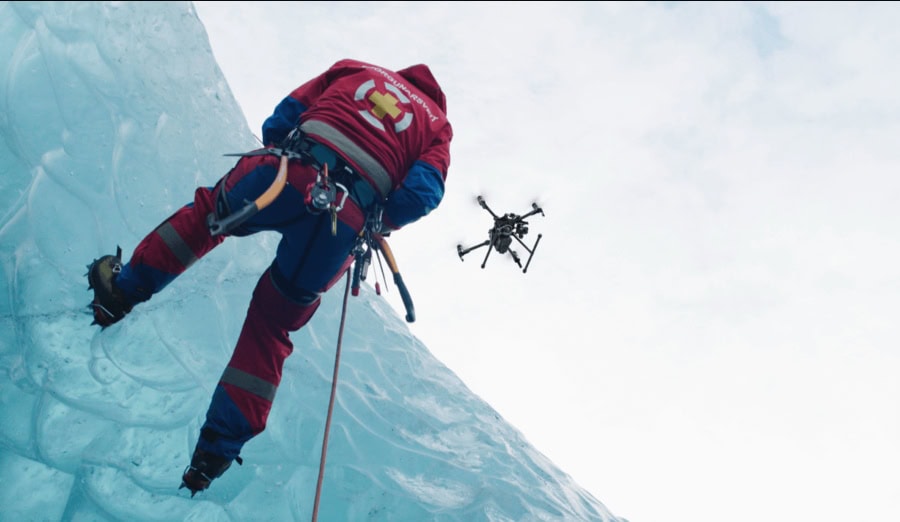
Credit: DJI
24. Custom Aerial Surveys
Provide custom aerial surveys for various industries, including agriculture, construction, and environmental monitoring.
Note: Be cautious when using the word survey in your marketing materials and service offerings. Some states, such as North Carolina, have been telling drone pilots they can get in trouble for using the word.
25. Sports and Action Photography
Capture dynamic aerial footage of sports events and action activities, such as skiing, Formula 1 racing, surfing, and mountain biking.
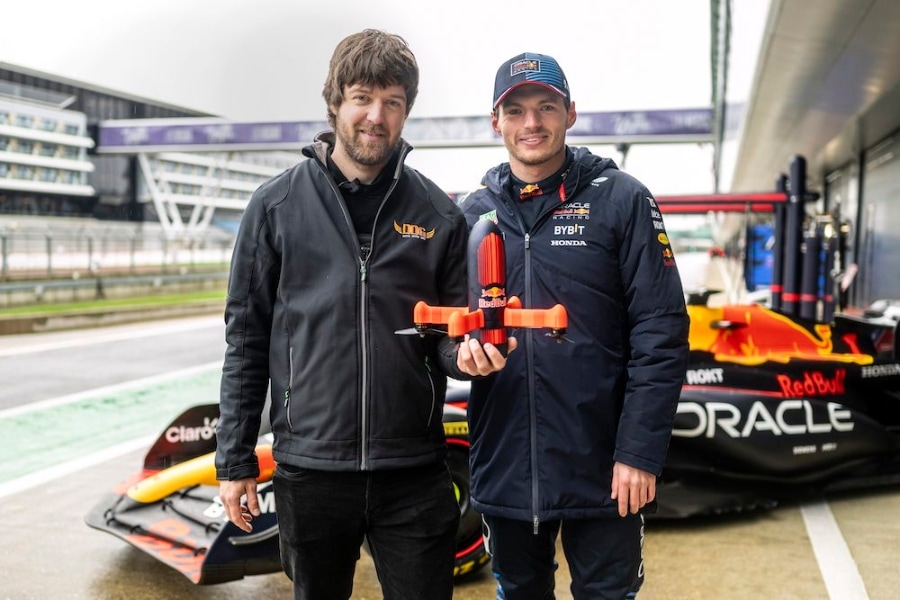
Credit: Red Bull
26. Infrastructure Inspections
Use drones to inspect infrastructure such as bridges, tunnels, and buildings for maintenance and safety checks.
27. Agricultural Drone Sales and Rentals
Sell, lease, or rent specialized drones for agricultural purposes, including drones for crop spraying and monitoring.
28. Delivery Services
Offer drone delivery services for small packages, food, and medical supplies, providing a fast and efficient alternative to traditional delivery methods.
29. Public Safety Support
Offer drone services to public safety agencies for tasks such as crime scene investigation, emergency response, and crowd monitoring.
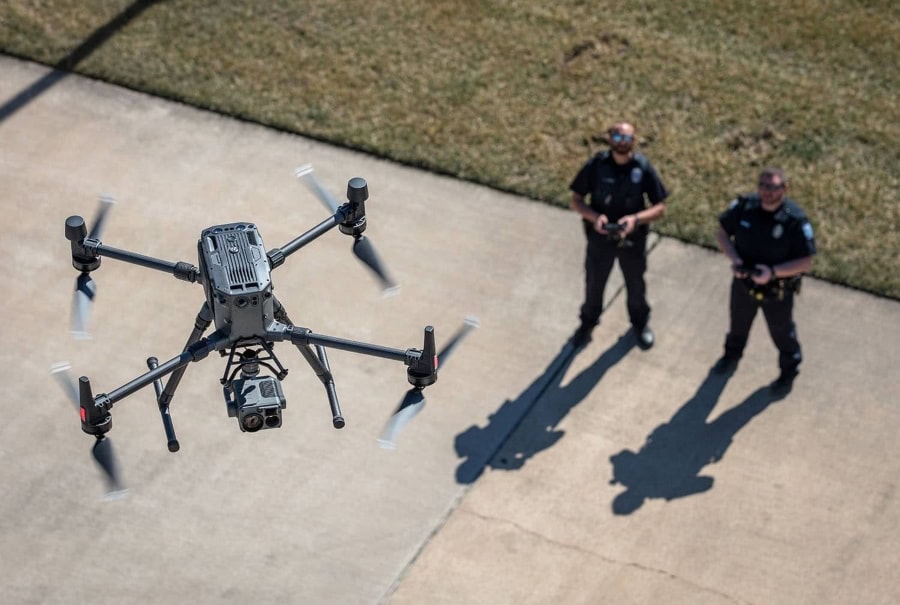
Credit: DJI
30. Drone Rental Services
Provide rental services for drones, allowing customers to rent drones for specific projects or periods without purchasing them.
31. Wedding and Event Photography
Offer aerial photography and videography services for weddings—especially destination weddings—and other events, capturing unique perspectives and memorable moments.
32. Forest Management
Use drones to monitor forest health, track illegal logging, and assist in conservation efforts.

Credit: DroneSeed
33. Surveying for Mining Operations
Conduct aerial surveys of mining sites to assess land conditions, plan excavation work, and monitor environmental impact.
34. Scientific Research
Use drones to gather data for scientific research, such as wildlife studies, environmental monitoring, and atmospheric sampling.
35. Art and Cultural Heritage Documentation
Capture aerial images and videos of historical and cultural sites for documentation and preservation.
36. Drone Consultant Services
Provide consulting services to businesses looking to integrate drones into their operations, offering expertise on equipment selection, training, and regulations.
